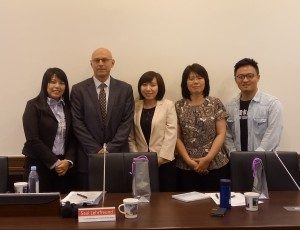
Mental Disorder, The Death Penalty and International Standards in Taiwan
- News
- 8 Jun 2017
On 30th May – 2nd June 2017, Co-Executive Director, Saul Lehrfreund, and forensic psychiatrist, Dr Richard Latham, were in Taiwan engaging policymakers and judges and medical professionals on the death penalty, mental disorder and human rights in the criminal justice system.
The delegation was coordinated by the British Office in Taipei and followed on from our visit in October last year, where we were also joined by Sir Keir Starmer MP, former UK Director of Public Prosecutions.
Discussions were held with key policymakers and legislators on the application of the death penalty in Taiwan and the international legal context. We met with institutions that have a key role to play in driving and implementing legal reforms, including the Ministry of Justice, National Security Council Advisor, the Judicial Reform Committee and legislators. Discussions focused on the need to further embed the ICCPR into judicial practice and for political leadership in moving Taiwan towards abolition. A series of lectures and workshops were also held at the National Taiwan University Hospital, the National Taiwan University, the Judges Academy and the Legal Aid Foundation. The talks covered international standards and the death penalty and best practice relating to the treatment of those with mental disorder in the criminal justice system.
The visit was the latest initiative in a wider programme of work strategically tackling the issue of the death penalty in Taiwan. In 2014, in association with the Taiwan Alliance to End the Death Penalty, we published a report The Death Penalty in Taiwan, highlighting where Taiwan’s use of the death penalty in domestic law and practice falls short of the minimum standards outlined in the ICCPR. The report identified gaps in the protections afforded to those with mental illness, creating a very real risk of mentally disordered persons being subject to the death penalty, in violation of international standards.
In 2015, in association with the Taiwan Alliance to End the Death Penalty, we published a handbook on forensic psychiatric practice in Taiwan, providing a practical guide for local lawyers and medical experts engaged in capital cases. We are already seeing that our on-going engagement in Taiwan is making a difference locally. There has been an increased use of forensic psychiatric evidence in capital trials and some recent positive decisions from the Supreme Court, who have refused to impose death sentences in a number of cases where mental disorder has been diagnosed.

The case of Tseng Wen-chin is illustrative of the new approach being adopted. In May 2016 the Supreme Court upheld a life sentence for Tseng, who was convicted of the murder of a 10 year-old boy in 2012. Tseng was assessed by a psychiatrist and found to be suffering from depression and anxiety at the time of the offence. Taking into account the medical evidence, the Court held that a death sentence was incompatible with Taiwan’s obligations under the ICCPR and should not be imposed. Public debate following the Court’s ruling revealed an increased awareness of issues raised through our work and a more balanced understanding of the treatment of mentally disordered offenders in the criminal justice system.
We hope our latest visit will help to further raise levels of understanding and expertise on forensic psychiatric practice as it relates to serious crimes, and continue dialogue between judges, prosecutors, defence lawyers and mental health professionals, resulting in the better protection of those with mental disorder. Continued engagement will also help to galvanise political action in moving Taiwan away from the death penalty.
Read more
“Life Sentence, Not Death Penalty, for ‘Random Killing’ in Taiwan”, The News Lens International, 12th May 2017 – Read about the latest case where the Supreme Court refused to impose a death sentence on a person found to be suffering from schizophrenia.
“A fight to the death: stopping the death penalty in Taiwan”, The Guardian, 3rd October 2017 – An in-depth look at our work in Taiwan.




















